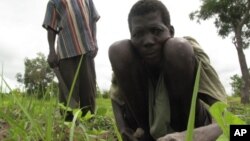When the government of Sudan decided to ramp up efforts to eradicate river blindness, they looked to the nation’s women. This month the country’s Ministry of Health announced the strategy appears to have worked in at least one region, Abu Hamad.
The key innovation to eliminating the disease was when the government decided to include women and families in distributing drug treatments, said partner aid agency The Carter Center. When the new program was introduced in 2006, 100 percent of the volunteers administering government-supported drug treatments for river blindness were men.
The drug just wasn’t reaching enough people, said Dr. Frank Richards, the River Blindness Director for the Atlanta-based Carter Center. The drug, Mectizan, stops infected people from transmitting the parasite to others, and needs to be administered on a community-wide basis.
According to the Carter Center, Sudanese women had traditionally played a key role in maintaining family health, but that role had been diminished “by the introduction of modern medicine, a male-dominated field.” The Carter Center said re-integrating women into this process made sense: “Women make up half of the community's population, and therefore, their participation in the elimination effort is crucial.”
Richards said distribution campaigns were also increased from once a year to once every six months.
These changes appear to have paid off: “Testing that had been done in the community all indicated that the parasite was gone, that it had been -- what we think – is eliminated,” Richards said.
That means, for the time being, there are no eye or skin infections – the common effects of the disease - and no evidence of the parasite in either people or the black flies that carry the parasite in the area.
Richards stressed, however, that they must monitor the area for three years, without administering treatment, to confirm that the disease does not re-emerge. Only then can Sudan declare the disease completely eradicated from the region, according to World Health Organization standards.
"It was a great time for celebration, but a cautious celebration,” he said. “Everybody understands that we have to maintain this period of post-treatment surveillance of three years, and then we’ll get to celebrate again.”
In the 1980s, the last period before intervention activities began, Richards said between 17 and 18 percent of Abu Hamad’s population of about 100,000 residents was infected.
River blindness can damage the eyes and skin and, in the worst case, it causes blindness.
The key innovation to eliminating the disease was when the government decided to include women and families in distributing drug treatments, said partner aid agency The Carter Center. When the new program was introduced in 2006, 100 percent of the volunteers administering government-supported drug treatments for river blindness were men.
The drug just wasn’t reaching enough people, said Dr. Frank Richards, the River Blindness Director for the Atlanta-based Carter Center. The drug, Mectizan, stops infected people from transmitting the parasite to others, and needs to be administered on a community-wide basis.
According to the Carter Center, Sudanese women had traditionally played a key role in maintaining family health, but that role had been diminished “by the introduction of modern medicine, a male-dominated field.” The Carter Center said re-integrating women into this process made sense: “Women make up half of the community's population, and therefore, their participation in the elimination effort is crucial.”
Richards said distribution campaigns were also increased from once a year to once every six months.
These changes appear to have paid off: “Testing that had been done in the community all indicated that the parasite was gone, that it had been -- what we think – is eliminated,” Richards said.
That means, for the time being, there are no eye or skin infections – the common effects of the disease - and no evidence of the parasite in either people or the black flies that carry the parasite in the area.
Richards stressed, however, that they must monitor the area for three years, without administering treatment, to confirm that the disease does not re-emerge. Only then can Sudan declare the disease completely eradicated from the region, according to World Health Organization standards.
"It was a great time for celebration, but a cautious celebration,” he said. “Everybody understands that we have to maintain this period of post-treatment surveillance of three years, and then we’ll get to celebrate again.”
In the 1980s, the last period before intervention activities began, Richards said between 17 and 18 percent of Abu Hamad’s population of about 100,000 residents was infected.
River blindness can damage the eyes and skin and, in the worst case, it causes blindness.





